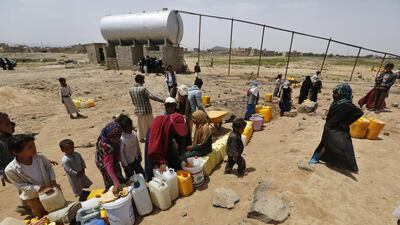Yemen’s warring factions seem to be a long way from accepting a political solution to the impasse over the country’s future. This means talks in Muscat and Geneva, and whatever other bilateral meetings are held in between, will not be as fruitful as hoped.
However Abdul Rahman Al Rashid, writing in the London-based daily Asharq Al Awsat, said this meant that even the recent attack on Saudi’s southern border would not accomplish anything for the rebels.
“As long as the desire to agree on a reasonable solution is absent, the parties in Yemen can’t hope to reach a solution except in one of two cases: a partial military victory or an inability to continue the fighting,” he said.
The mediators have notified the Houthis that they refuse to negotiate over the military presence of their militias in Yemeni cities. For its part, the legitimate government led by president Abdrabu Mansur Hadi is facing the dilemma of dealing with former legitimate army factions that have joined the ranks of rebels following Sanaa’s fall.
This reflects the highly complicated situation in Yemen, with the majority of the government army becoming illegitimate, while the legitimate government, including president Hadi and prime minister Khaled Bahah, is in Riyadh.
This situation could continue unchanged until the end of the year, with continued fighting. He suggested that only then would the Geneva talks become viable.
“And then, the GCC-proposed solution would prove to be the only possible solution to consider because it is the only reasonable one,” the writer added.
“It proposes to let Yemenis choose through elections, under UN supervision. The winner would represent the Yemeni people and form the government.”
The US and the European powers would find that this was the only acceptable way out: all parties would acquiesce to the outcomes of legitimate elections, no matter who wins them. It is expected that a number of pro-Saleh forces would accept the outcome, since they would partially win.
As for the Houthis, they would object to elections because they are a small minority that operates as a militia. Their only path to power would be to enter into a large coalition, and that would diminish their influence.
“In the absence of clear thinking and wisdom, it is war, not talks, unfortunately, that would eventually wear Yemeni factions down and only then they would return to the only reasonable project that fell with Sanaa’s occupation,” he concluded.
In a separate comment in Asharq Al Awsat, editor in chief, Salman Al Dossari voiced his scepticism about the UN’s efficiency in the matter, noting that the international organisation seemed more concerned in signing conventions than in implementing them.
“Hence, we are once again preparing for another session of international talks in Geneva over the situation in Yemen. All this is while the Houthi rebels and their ally, the deposed president Ali Abdullah Saleh, were besieged militarily, politically and diplomatically,” he said.
“The UN is extending a lifeline to those who have blatantly disregarded all international and diplomatic laws and practices. It is as if the upcoming talks in Geneva are but another way for the UN to extend the crisis rather than solve it.”
Nobody is against a political solution that would lead to a viable solution. Also nobody wants to see the Houthi-caused war rage on in Yemen, but political dialogue mustn’t be a coup over existing political conventions that are binding to all parties involved.
Implementation of UN Resolution 2216, based on the outcomes of national dialogue and the GCC initiative, is the best solution for Yemen. It is a roadmap for any future solutions, the writer said.
Translated by Racha Makarem
RMakarem@thenational.ae

